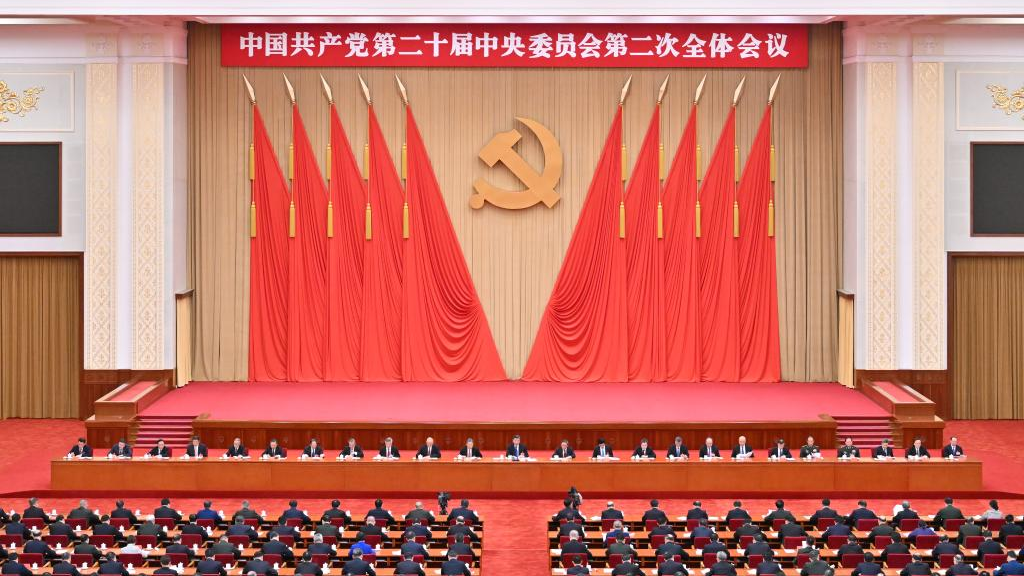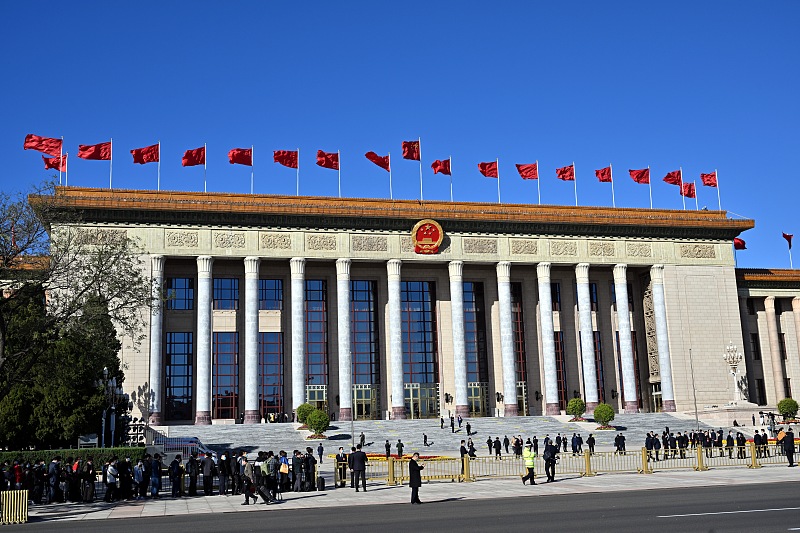
The second plenary session of the 20th CPC Central Committee was presided over by the Political Bureau of the CPC Central Committee in Beijing, capital of China from February 26 to 28, 2023. /Xinhua
The second plenary session of the 20th CPC Central Committee was presided over by the Political Bureau of the CPC Central Committee in Beijing, capital of China from February 26 to 28, 2023. /Xinhua
Editor's note: Xin Ge is an associate professor at the School of Public Economics and Administration, Shanghai University of Finance and Economics. The article reflects the author's opinions and not necessarily the views of CGTN.
The 20th Communist Party of China (CPC) Central Committee concluded its second plenary session on February 28, 2023 and sketched out a plan for the reform of the Party and state institutions to be deliberated at the first session of the 14th National People's Congress.
The plenary session was attended by 203 full members and 170 alternate members of the CPC Central Committee. Deputy secretaries of the CPC Central Commission for Discipline Inspection and leading officials of related departments were present in a non-voting capacity. Before adopting the plan at the Party plenary session, the CPC Central Committee has also held a consultative meeting to absorb opinions and inform non-Communist political parties, the All-China Federation of Industry and Commerce and personages without Party affiliation of this plan.
The communique issued by the second plenary session stressed the backdrop of this reform, "At present, the profound changes of the world unseen in a century are accelerating, and the world has entered a new period of turmoil and change." And China's development "has entered a period in which strategic opportunities, risks and challenges coexist, with increasing uncertainty and unpredictability."
On the road to Chinese modernization, it's necessary to deepen institutional reforms in key areas and ensure more refined Party leadership over socialist modernization, more optimization in the division of functions to achieve more efficiency over management of the Party and state institutions.
The communique suggested that since the 18th CPC National Congress, the CPC Central Committee has made deepening the reform of Party and state institution an important task in the modernization of the system and capacity for governance. Years of systematic and holistic reform of the Party and state institutions have guaranteed the Party and the country to make historic achievements.

The closing session of the 20th National Congress of the Communist Party of China (CPC) was held at the Great Hall of the People in Beijing, October 22, 2022. /CFP
The closing session of the 20th National Congress of the Communist Party of China (CPC) was held at the Great Hall of the People in Beijing, October 22, 2022. /CFP
This will be the ninth time for the reform of the CPC and state institutions of China since 1982. These reforms feature two key words: reduction and optimization.
Prior to the 1982 institutional reform, the State Council of China encompasses 100 departments with more than 50,000 staff, which was reduced to 61 after the reform in 1982. The ministries and commission affiliated with the State Council was reduced from 52 to 42 in the same year. Since then, the state institutional setting had been refined. In the last round of reform in 2018, the number of departments directly under the State Council reached a record low at 26. In particular, the reform in 2018 involved over 1.8 million staff at the central- and ministerial-level institutions. This can be depicted as a systemic, holistic and reconstructive reform.
The second key word is optimization. Aside from reducing the number of departments every time, the institutional reforms have seen constant change and merging of government functions.
In accordance with the "one category of matters is coordinated by only one department," the 2018 reform focused on the optimization of responsibilities in areas such as the registration of natural resources, land and space planning, supervision of urban and rural pollution discharge, management of agricultural investment projects, anti-monopoly law enforcement, urban and rural medical security, service guarantee for veterans, emergency management, nature reserve supervision, etc., which resolved more than 60 long-standing issues with overlapping responsibilities and unclear relationships, enhancing state institutions in economic regulations, market supervision, social management, public services and environmental protections.
For instance, to alleviate the situation of "difficult and expensive medical treatment," the National Healthcare Security Administration was established. To crack down on the problem "several big caps cannot manage a broken straw hat," the State Administration for Market Regulation was formed, merging the regulatory functions previously scattered in multiple departments.
This year marks the first year to implement the guiding principles of the 20th National Congress of the CPC. As pointed out in the communique of the second plenary session, the 20th CPC National Congress made important arrangements for institutional reforms, which have far-reaching significance to comprehensively build a modern socialist country and promote the great rejuvenation of the Chinese nation.
It can be envisioned that the reform on the one hand will highlight key industries and fields in national development, and also involve a wide range of areas to address problems that concern society on the other, exerting a profound impact on economic and social advancement on the new journey of the new era.
(If you want to contribute and have specific expertise, please contact us at opinions@cgtn.com. Follow @thouse_opinions on Twitter to discover the latest commentaries on CGTN Opinion Section.)